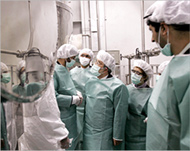Iran drops demand for N-pact change
Iran has dropped its demand for changes to a key agreement designed to reassure the world that Tehran does not want nuclear weapons.

Last week Iran promised the European Union it would halt all activities related to uranium enrichment, a process that creates atomic fuel for power plants or weapons, in a bid to neutralise the threat of economic sanctions.
But Tehran then demanded an exemption for some 20 enrichment centrifuges for research purposes. Western diplomats said this was impossible and could only deepen suspicions that Tehran has a secret weapons programme, as Washington alleges.
The head of the Iranian delegation to this week’s International Atomic Energy Agency (IAEA) board of governors meeting, Hossein Mousavian, said an agreement had been reached, but still needed the final stamp of approval from Tehran.
Centrifuges dismissed
He had said earlier in the day that the centrifuges were not important and reaffirmed his commitment to the deal.
 |
|
Iran maintains that it is not |
“We are fully committed to a suspension of enrichment and related activities,” Mousavian said.
He added that the EU deal did not cover centrifuge research and development, but European diplomats said such research was clearly banned under the agreement suspending enrichment.
Asked what broke the three-day deadlock over Iran’s request, which had threatened to torpedo the entire agreement, one diplomat said: “It was (the EU’s) hard stance. The Iranians just gave up.”
EU frustration
Western diplomats in Vienna said the request to amend the terms of the freeze had infuriated not only the European Union, which is offering Iran a large package of political and economic incentives, but also Washington, which despite Iranian denials has long accused Tehran of trying to build an atomic bomb.
Some Western diplomats said they thought Iran was only using the requested exemption as a bargaining tool, and would drop it if the final resolution was soft enough on Tehran.
 |
|
Non-aligned diplomats visited |
But others said the Iranians might be serious about keeping the centrifuges operating, and noted that a similar deal in October 2003 collapsed when the Iranians resumed production of centrifuge components.
Diplomats said Washington was unhappy with both the EU-Iran deal and the latest draft resolution circulated by France, Britain and Germany, but would not block them.
Non-proliferation analyst Jon Wolfsthal said an embargo on Iranian oil or military strikes could force Iran to give up its quest for a nuclear weapons capability, but both were ruled out at present by the high price of oil and the drain on US military resources in Iraq.
In a 15 November report summarising his two-year examination of Iran’s nuclear programme, IAEA chief Muhammad al-Baradai declared that Tehran had not diverted any of its declared nuclear material to a weapons programme, but did not rule out the existence of secret nuclear activities undiscovered by UN inspectors.